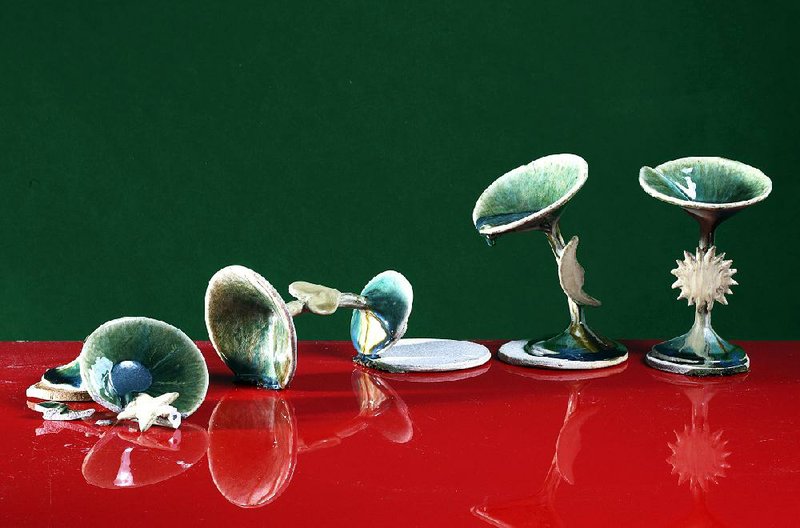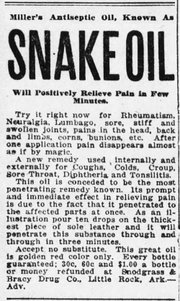For New Year's Day, nothing seemed more natural than to find out what the daily newspaper offered up as sure-fire hangover cures 100 years ago. How funny would they be?
After all, these were newspapers in which ads for Snake Oil (brand-name, Miller's Antiseptic Oil) appeared all the time, along with ads for arsenic-laced potions and powders to cure baldness.
But there were no stories about genteel methods for easing the pangs of detoxification published around New Year's 1918 by either the Arkansas Gazette or the Arkansas Democrat. Readers would have run the editors out of town.
Arkansas was, at least legally, a bone dry state then. The desiccation began years before January 1919, when Arkansas became the 27th state to ratify the 18th Amendment to the U.S. Constitution.
Some of us (me, anyway) were brought up to think of the great Prohibition of 1920-1933 as an unwanted mandate foisted upon unwilling states by an interfering fed'ral gubbmint. Unwilling many citizens demonstrably were, but the shove for prohibition of alcohol came from the states, including Arkansas, where widespread alcohol abuse was not harmless.
It was more like today's opioid epidemic, a mire of despair. It encouraged venereal diseases, general epidemics, death by freezing, setting oneself a-fire, somersaulting off the bridge and worse -- crimes against and by malnourished, unsupervised children.
Historian Tom Dillard has described the history of alcohol in Arkansas through his columns for the Arkansas Democrat-Gazette, and I encourage you to look those up online. They are not hard to find, just search for his name and a word like "bootlegging" or "alcohol."
But in keeping with today's holiday mood, here are two samples of ambitious newspaper prose that made me laugh out loud in 2017. Both are from the 1910 Arkansas Gazette, and both depict boozy street life in Argenta, the area that today is downtown North Little Rock.
I'm paraphrasing a lot of the first one, because in addition to its glorious bombast, it mocks a poor black man's speech. "Local color" was a 19th-century literary plague that slopped into the 20th, and myriad offenses against decency were committed by clever writers trying to depict dialect.
Here's the Argenta news from Sept. 19, 1910:
Charley Coulter, alias "Shine," is the proprietor of a scheme which for effectiveness in separating the unwary from their wherewithal has Old Man Demidoff's Russian prisoner graft completely backed off the boards. The beauty of Shine's scheme lies in its plausibility and simplicity, and, briefly, it stacks up rather thus:
Along about 10 o'clock or better on Sunday night, when the day's enforced prohibition has caused the dry dust to lie in layers upon the leathery tongues of the bibulous, and each separate lingual papilla stands on end like quills upon the fretful porcupine, Shine selects his victim. He approaches with a diplomacy and an exhibition of the knowledge of applied psychology that is worthy of a better cause.
Let's pause here to acknowledge the unnamed reporter's fine reference to Shakespeare's Hamlet, in which the ghostly father complains that he is not allowed to tell his son things so terrible they would freeze his blood and cause his knotted and combined locks to part ...
And each particular hair to stand on end,
Like quills upon the fretful porpentine.
Having shown off his education, the Gazette reporter continues with Coulter's approach:
"W'am night," he begins tentatively.
"Yep!"
"Kine uh dry, too."
Another weary "yep," and then Shine gets down to business.
He offers to fetch two discount bottles of Budweiser in exchange for being allowed to drink the foam off the top. All he needs is four bits -- 50 cents. The marks pony up, and Shine promises to return in seven seconds.
Exit Shine, and at this point the comedy is supposed to end.
But one of Shine's victims informs the police.
When "pinched" by Sergeant Campbell his countenance assumed a complicated expression of utter ignorance, which was natural, and injured innocence, which was absurd. ...
There follows a bolus of awful local-color writing we do not need to repeat, leading to --
But the preponderance of testimony broke down Shine's assumption and though he lied right royally and well, when confronted by several of his compeers who were unanimous in saying of him, "Thou art the man," he gave up.
Coulter claims that while he did take the money, all the black men accusing him also work the same game, and they have turned on him because he refused to give them money he did not have to give and also because he is a friend of the law:
"Ah tells on 'um when dey gits baad, en day dun foun' hit out. But ev'ey las'n one uv 'em 'tains money un'uh false puttences dess lak Ah has done."
Shine's case is set for this morning. ... If his assumption of friendlessness is correct, Shine will probably be the guest of the county for a few days.
Example 2, from the Jan. 7, 1910, Gazette, is less fraught with racial insults but since it also appeared in the Argenta news report, it may have come from the same pen.
Seven Bibulous Men to Face Different Bar
A series of bright New Year resolutions were shattered beyond repair along Main street yesterday afternoon. Incidentally, seven Argentans will face Police Judge Silbeck this morning, charged with having fallen by Argenta's chief wayside yesterday. The cold and the icy sidewalks were responsible in more ways than one for the fall from grace and prestige of the high resolves of those who "are seven."
The reporter describes only three of the seven arrests.
Three Iron Mountain shopmen created a diversion along Main street about 3 o'clock. The three were strolling with difficulty along Main street near Third when first sighted by a patrolman. Before the patrolman could reach them they had executed a well-conceived series of maneuvers and entered a saloon, much to the amusement of watchers and the chagrin of the officer of the law.
Soon they emerged from the shelter of their retreat and continued their stroll south on Main street. Again they were sighted by the watchful policeman, and again they escaped him by a hurried and united movement into a saloon.
The performance was repeated along the main street until the three had traveled some three and a half blocks, while clerks and shopmen watched from convenient windows their triumphs over the patrolman.
When about to outwit the patrolman for the last time a weaker member of the triumvirate set his unsteady foot upon the glazed surface of an ice covered crossing, and all three fell -- into the arms of the police. The entire performance occupied the better part of three-quarters of an hour.
Although the behavior is nothing to encourage, I do hope these old clippings encourage a revival of the glorious word "bibulous." Let us conspire to make that happen in 2018, but let us use it wisely and without causing any harm.
Email:
cstorey@arkansasonline.com
ActiveStyle on 01/01/2018

